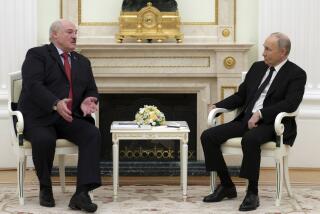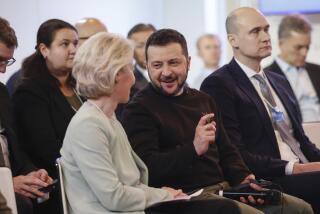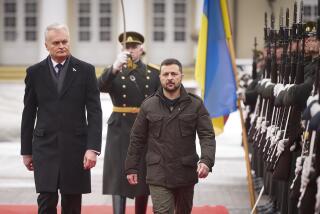Putin leaves G-20 early as Obama, European leaders meet on Ukraine
President Obama said Sunday that world leaders agree that Russian President Vladimir Putin isn’t following the “letter or the spirit” of his commitment to peaceful actions in Ukraine but that the sanctions currently in place against his regime are “biting plenty good.”
After a closed-door meeting with European leaders on the subject, Obama said the current level of isolation of Russia will continue as long as the country violates the principle that “you don’t invade other countries or finance proxies” that do.
“It is not our preference to see Russia isolated as it is,” Obama told reporters at the conclusion of the Group of 20 summit, where the Ukraine crisis overshadowed the usual focus on economics. The leaders are “very firm on the need to uphold international principles.”
The remarks capped off a weekend of personal isolation for the Russian president at a G-20 summit notable for the other leaders’ awkwardness around him. Canadian Prime Minister Stephen Harper summed up the sentiment in a direct comment to Putin that he would shake his hand, but had only one thing to say – get out of Ukraine. Putin left the summit early, citing the long flight home.
Still, the G-20 leaders’ statement issued at the close of the summit did not mention the Ukraine crisis, saying only that there were risks from geopolitical tensions. And in his press conference following a week of summits and meetings throughout Asia, Obama did not announce any significant changes in his approach to Russia -- or in any of the world’s hot spots, for that matter.
Despite rumblings back home that he is preparing to overhaul his approach to battling the Islamic militant group known as Islamic State, Obama said he is simply continuing his weekly review and is not contemplating a new strategy to overthrow Syrian President Bashar Assad.
The president also responded to congressional testimony by his top military advisor last week that there might be circumstances in which he would advise the deployment of American troops to Iraq. Obama said that if ISIS obtained a nuclear weapon he would expect the chairman of the Joint Chiefs of Staff to advise the use of ground troops -- and that he would follow it.
The two-day summit of the world’s largest economies ended with Obama and other world leaders agreeing to boost global economic growth by at least 2% by 2018 through various investments, infrastructure spending and other efforts by member countries -- an ambitious target that, if met, would add more than $2 trillion to the world economy and millions of new jobs.
On the economic discussions, Obama operated from a position of relative strength. The American economy has outperformed most other major economies, and while that’s left the U.S. in the uncomfortable position of shouldering global growth, it also enabled Obama to boast a little and turn the spotlight on other troubled economies, particularly Europe and Japan.
Obama’s influence at the summit also was seen in the final communique’s inclusion of statements on climate change, an issue that Australian Prime Minister Tony Abbott sought vigorously to keep off the agenda. The leaders’ statements, though, were relatively modest in that they encouraged nations to unveil targets for reducing greenhouse gases before the global climate conference in Paris next year, but only “for those parties ready to do so.”
The G-20 leaders also committed to do all they can to contain the Ebola outbreak, and they endorsed an anti-corruption action plan despite initial resistance from the Chinese.
Most of the summit focus, however, was on the drama surrounding Putin, with speculation swirling Sunday about when Putin might leave.
Abbott, host of the summit, shook hands with Putin at his arrival even though just a month before he’d threatened to tackle Putin out of anger over the deaths of 38 Australians in the downing of a Malaysia Airlines flight over Ukraine. But he sent only a low-level official to meet Putin at the airport. And when leaders gathered for their group portrait, Putin found himself standing at the outer edge of the photograph.
Obama, asked about his exchanges with Putin over the weekend, described the talks on the sidelines of the summit as “businesslike and blunt.”
“We would prefer a Russia that is fully integrated with the global economy,” he said at the press conference.
More to Read
Start your day right
Sign up for Essential California for news, features and recommendations from the L.A. Times and beyond in your inbox six days a week.
You may occasionally receive promotional content from the Los Angeles Times.








